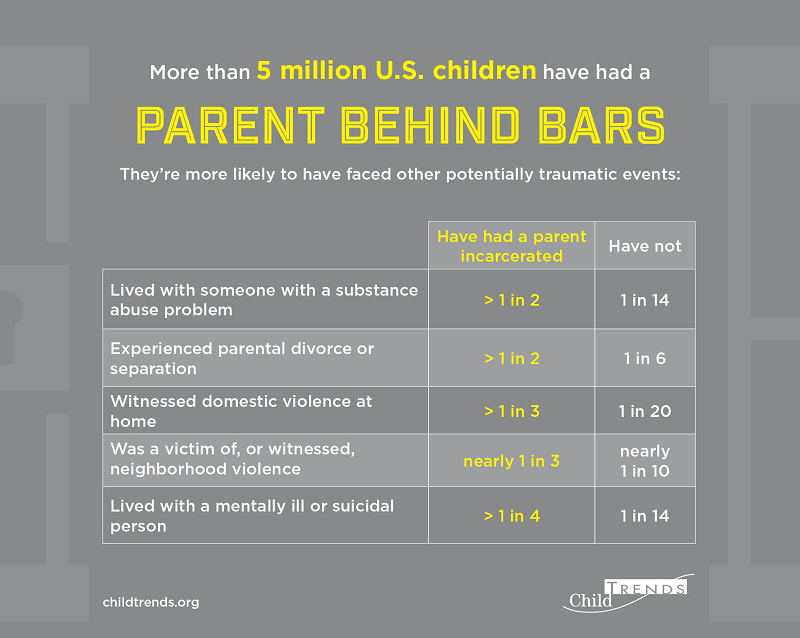By now, “Orange is the New Black” fans have had ample time to binge watch Season 3, which was released in early June. The season premiered with an episode about Mother’s Day at the prison, cluing viewers into some of the emotional difficulties incarcerated mothers and their families may face. The show was prompted by Piper Kerman’s book, Orange is the New Black: My Year in a Women’s Prison, which describes her experience in federal prison, including issues regarding her relationships in and outside of prison, mental illness and substance abuse among prisoners, the prison social structure, and even life after prison.
“Orange is the New Black” depicts women from diverse backgrounds, which got me wondering about what the overall population of incarcerated women looks like in the United States. [inlinetweet prefix=”” tweeter=”” suffix=”, per @childtrends”]More attention has been given to the growing population of incarcerated females[/inlinetweet], particularly mothers. In early August, the Health and Human Services’ Office of Family Assistance, through its Healthy Marriage and Responsible Fatherhood efforts, hosted a webinar (our Mindy Scott was a panelist) on incarcerated mothers, the effect on their families, and implications for healthy marriage and responsible fatherhood programs. There’s a related brief in the works.
This week, Child Trends released a report citing that more than five million U.S. children have had a resident parent incarcerated at one point or another. While men make up 99 percent of the U.S. prison population, the number of women and mothers involved in the criminal justice system has grown significantly over the last 20 years. [inlinetweet prefix=”null” tweeter=”null” suffix=”null”]Since 1991, the numbers of mothers in state and federal prisons has more than doubled, to an estimated 120,000[/inlinetweet]. Like Piper and many of her fellow prisoners, the majority of women are incarcerated for non-violent related offenses, like drug, property, or public-order offenses.
Since incarcerated women are often custodial parents when they are sent to prison their absence can have a profound effect on their children, partners, and other family members. Maternal incarceration can negatively influence children’s well-being—many of these children demonstrate depression, anxiety, and rule-breaking behavior, and are more likely to drop out of school, be suspended, be absent from school, and do poorly academically, compared with classmates without a parent in prison.
One of the hardest things for mothers to deal with when in prison is separation from their children and other family members. Maintaining these relationships can be one of incarcerated mothers’ primary concerns, potentially affecting their mental health while in prison. [inlinetweet prefix=”” tweeter=”” suffix=”, per @childtrends”] It can be difficult for children to visit their mothers in jail or prison[/inlinetweet]. There may be issues with visitation policies, like a lack of child-friendly visitation spaces, or it may be difficult for the children’s new caretakers to bring them to see their mothers. Because women’s prisons are more scarce than men’s, incarcerated women tend to be farther away from their families; these distances can make it difficult for the current caretaker to arrange visits.
Upon reentry from prison, mothers may prioritize reuniting with their children and other family members. They may have other needs that should to be addressed, including treatment for unresolved substance use and mental health issues and trauma histories, as well as vocational/job training to secure employment and reduce economic instability—a key indicator for preventing repeat incarceration. Facilitating their healthy relationships can also help in these areas, though. Research has shown that women’s relationships with their families, romantic partners, and friends can have a positive influence in their lives, as they can provide support, social capital, motivation, and other opportunities that can decrease the likelihood of reengagement in criminal behavior.
Service providers, including those running healthy marriage and relationship programs, are starting to pay more attention to this relatively small but important population. These programs have the potential to serve different family members affected by incarceration, including incarcerated mothers themselves, their adolescent children, fathers, and other caregivers. Prison nurseries have even been developed for mothers who have their children while in prison, where they can raise their children for a limited period of time. Prison nurseries may reduce the chance that the mother returns to prison.
Season 4 of “Orange is the New Black” was recently announced. Now that I know more about the challenges incarcerated mothers face, I will be watching this upcoming season with a different perspective.
Artemis Benedetti, Research Analyst, Reproductive Health and Family Formation

© Copyright 2025 ChildTrendsPrivacy Statement
Newsletter SignupLinkedInYouTubeBlueskyInstagram